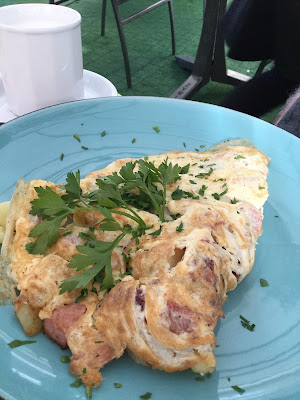Bryan’s
travel journal continued:
Tuesday September 17
We woke up to another sunny day and walked again to the Europejska
for breakfast.
Then we all walked down to Wawel Castle. Along the way we visited the Franciscan Church of St Francis of Assisi which has an impressive stain glass window by Stanislaw Wyspianski as well as a certified copy of the Shroud of Turin.
We also passed by the grand statuary in front of the Church of Saints Peter and Paul. We wandered the grounds of the Royal Castle on Wawel Hill and visited the Royal Cathedral of St. Stanislaus and St. Wenceslaus which has the Sigismund Chapel. The cathedral, which was the traditional coronation site of Polish monarchs, is closely associated with the religious life of Karol Wojtyla who became Pope Jean Paul II.
Then we all walked down to Wawel Castle. Along the way we visited the Franciscan Church of St Francis of Assisi which has an impressive stain glass window by Stanislaw Wyspianski as well as a certified copy of the Shroud of Turin.
A modernist, Stanislaw Wyspianski was “one of the most outstanding artists of his time in Poland”. In addition to working with stained glass, he painted, designed furniture, and wrote poetry and plays. Sadly, he died in 1907 of syphilis when he was only 38 years old.
We also passed by the grand statuary in front of the Church of Saints Peter and Paul. We wandered the grounds of the Royal Castle on Wawel Hill and visited the Royal Cathedral of St. Stanislaus and St. Wenceslaus which has the Sigismund Chapel. The cathedral, which was the traditional coronation site of Polish monarchs, is closely associated with the religious life of Karol Wojtyla who became Pope Jean Paul II.
Later Nestor and Bryan walked across the river to see Oscar
Schindler’s enamel factory which was not easy to find. It was a good thing that
we stopped for a pleasant lunch. When they did locate it (thank heavens it was
next to the hard-not-to-notice MOCAK, the gallery of contemporary art). They could
not enter because there were no tickets available! On the way back they visited
the Galicia Jewish Museum in the Kazimierz. This museum, established in 2004,
is a photo exhibition commemorating the 800-year Jewish culture and life in
western Galicia (southeastern Poland). Their trek so far had made them a tad
peckish, so they stopped for Polish tapas: vodka shot with sardine paté and later, a donut and coffee.
Choosing a
more relaxing afternoon than the guys, I couldn’t resist trying one of the desserts
offered at a small restaurant near the Rynek.
Raspberries
and whipped cream in a meringue: absolutely marvelous!
While waiting for dinner to arrive, Bryan went for a short stroll and went inside St. Mary’s Basilica and viewed its wooden Gothic altarpiece carved in the late 15th century by Veit Stoss.
This time, I had some perogies stuffed with duck and others with potatoes.
In The Polish Country Kitchen Cookbook, Sophie Hodorowicz Knab tells us that, “In 1842, a cookbook devoted solely to the preparation of potatoes was published. . . . purées, salads, pastry, . . . ‘au gratin,’ puddings, tortes, and even dishes utilizing potato peelings.”
Wednesday September 18
At 7:00 am we were picked up and take to the airport. Our talkative driver was knowledgeable and open about the political situation in his country. He was far more liberal-minded than many of his fellow countrymen.
A little after 9:00 am we left Krakow for Munich in an Airbus 319 and around 3:00 pm from Munich to Vancouver on an Airbus 350. The trip home was long but smoother than our flight to Poland.








































